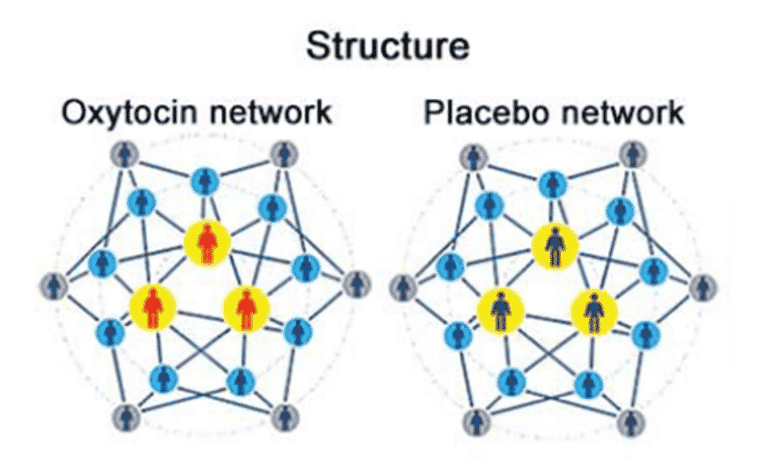Summary: Administering oxytocin to influential members of a social network helped increase overall group cooperation.
Source: SfN
Administering oxytocin to the central members of a social network spreads cooperation via increased punishment of uncooperative behavior, according to new research published in Journal of Neuroscience.
Large groups of people cannot peacefully coexist without cooperation — more social and cooperative people tend to end up as leaders in formal organizations and informal social groups. Yet cooperation can conflict with individual goals.
Oxytocin, known for its involvement in bonding, may explain how humans evolved the cooperation needed to live in groups.
Li et al. gave intranasal oxytocin or a saline placebo to participants who occupied the most influential, or central, role in artificial social networks. The participants played a series of virtual games with strangers.

In one game, the central members received money from peripheral members and set a threshold for the minimum offer they’d accept. When the central members received oxytocin, cooperation spread through the network; after many rounds of the game, the offer and acceptance threshold evolved into a fifty-fifty split, a sign of cooperation.
In another game, oxytocin increased the likelihood central members would choose to cooperate and then punish peripheral members for uncooperative behavior, which tracked with the group increase in cooperation.
These results indicate cooperation from influential group members spreads to the rest of the group, likely through increased enforcement of social norms.
About this social neuroscience research news
Author: Calli McMurray
Source: SfN
Contact: Calli McMurray – SfN
Image: The image is credited to Li et al., JNeurosci 2022
Original Research: Closed access.
“Oxytocin and the punitive hub — Dynamic spread of cooperation in human social networks” by Li et al. Journal of Neuroscience
Abstract
Oxytocin and the punitive hub — Dynamic spread of cooperation in human social networks
Human society operates on large-scale cooperation. However, individual differences in cooperativeness and incentives to free-ride on others’ cooperation make large-scale cooperation fragile and can lead to reduced social-welfare. Thus, how individual cooperation spreads through human social networks remains puzzling from ecological, evolutionary and societal perspectives.
Here, we identify oxytocin and costly punishment as biobehavioral mechanisms that facilitate the propagation of cooperation in social networks. In three laboratory experiments (n = 870 human participants, 373 males and 497 females), individuals were embedded in heterogeneous networks and made repeated decisions with feedback in games of trust (n = 342), ultimatum bargaining (n = 324), and prisoner’s dilemma with punishment (n = 204).
In each heterogeneous network, individuals at central positions (hub nodes) were given intranasal oxytocin (or placebo). Giving oxytocin (versus matching placebo) to central individuals increased their trust and enforcement of cooperation norms.
Oxytocin-enhanced norm enforcement, but not elevated trust, explained the spreading of cooperation throughout the social network.
Moreover, grounded in evolutionary game theory, we simulated computer agents that interacted in heterogeneous networks with central nodes varying in terms of cooperation and punishment levels.
Simulation results confirmed that central cooperators’ willingness to punish non-cooperation allowed the permeation of the network and enabled the evolution of network cooperation.
These results identify an oxytocin-initiated proximate mechanism explaining how individual cooperation facilitates network-wide cooperation in human society and shed light on the widespread phenomenon of heterogeneous composition and enforcement systems at all levels of life.






